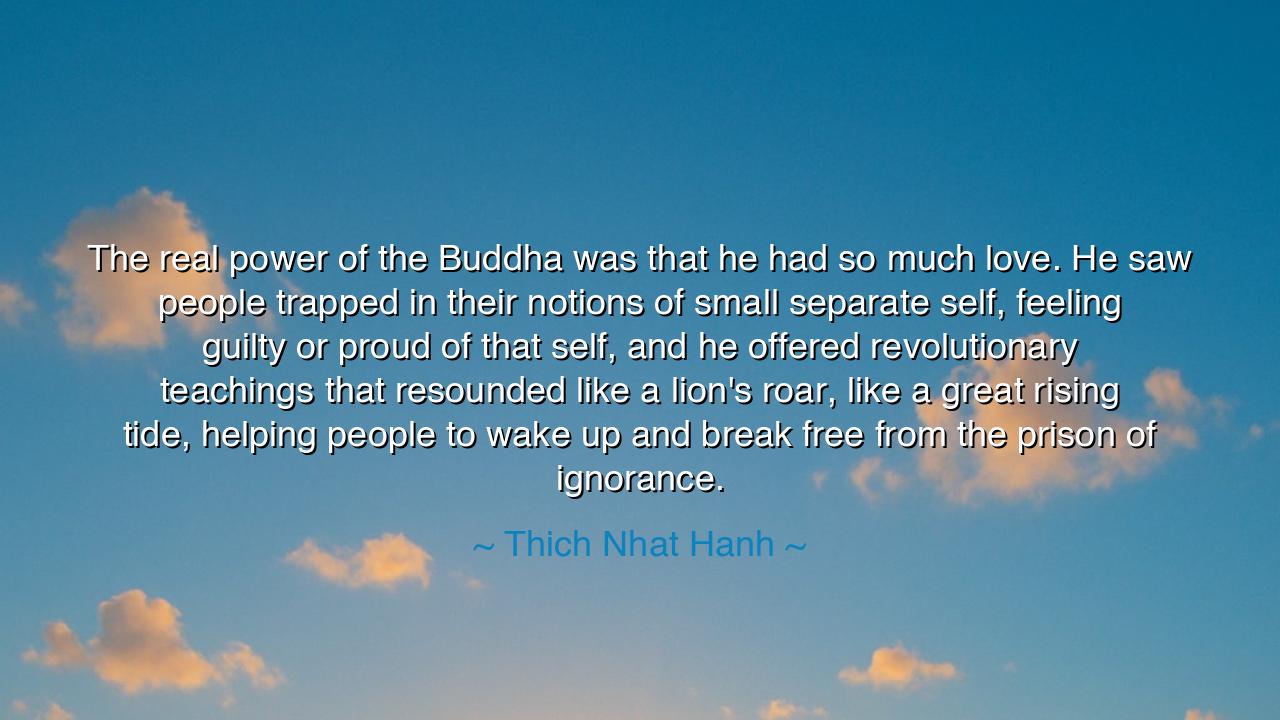
The real power of the Buddha was that he had so much love. He
The real power of the Buddha was that he had so much love. He saw people trapped in their notions of small separate self, feeling guilty or proud of that self, and he offered revolutionary teachings that resounded like a lion's roar, like a great rising tide, helping people to wake up and break free from the prison of ignorance.






The words of Thích Nh?t H?nh—“The real power of the Buddha was that he had so much love. He saw people trapped in their notions of small separate self, feeling guilty or proud of that self, and he offered revolutionary teachings that resounded like a lion's roar, like a great rising tide, helping people to wake up and break free from the prison of ignorance.”—are a hymn to the transforming force of compassion. They proclaim that the greatest power is not the sword, nor the throne, but love that sees clearly and embraces wholly. The Buddha’s might was not in conquest, but in awakening—lifting souls from the illusions of the separate self and revealing the vast freedom of interbeing.
This utterance speaks to the prison of ignorance, the chains of identity that bind human beings to suffering. Pride swells when the self is exalted; guilt festers when the self is condemned. Yet both are illusions, born of clinging to a “me” that does not exist apart from the great whole. The Buddha’s teaching, as Thích Nh?t H?nh declares, came like a lion’s roar, shattering delusion and awakening hearts to the truth that all beings are connected, and that liberation begins with compassion.
History offers us the luminous example of Emperor Ashoka, who, after the devastation of the Kalinga war, turned away from conquest and embraced the teachings of the Buddha. His reign became a testament to the power of compassion in governance, as he spread peace, tolerance, and care for all creatures. Ashoka’s transformation shows that even those who wield earthly power are humbled before the greater power of love—a power capable of reshaping nations and healing wounds no army could mend.
The quote also reminds us of the revolutionary nature of true compassion. It is not passive softness, but a force that overturns the old order of violence, greed, and ignorance. Like a rising tide, it sweeps away walls of separation, revealing that freedom is found not in clinging to the self, but in awakening to the unity of all life. Love, in this sense, is the most radical and enduring revolution of all.
Let this teaching endure for future generations: seek not the brittle pride of the ego nor the chains of guilt, but the boundless strength of compassion. The real power of the Buddha was not domination but awakening—teaching that love itself is the lion’s roar, the rising tide, the light that breaks the prison of ignorance. In walking this path, each soul too may awaken, and in awakening, help the world to breathe in peace.






AAdministratorAdministrator
Welcome, honored guests. Please leave a comment, we will respond soon